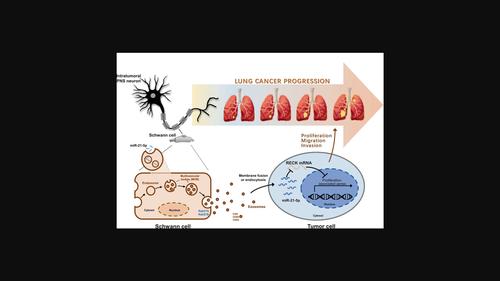Our official English website, www.x-mol.net, welcomes your feedback! (Note: you will need to create a separate account there.)
Schwann cell-derived exosomes promote lung cancer progression via miRNA-21-5p
Glia ( IF 6.2 ) Pub Date : 2024-01-08 , DOI: 10.1002/glia.24497 Yan Zhou 1 , Yao Zhang 1 , Jianlin Xu 1 , Yue Wang 1 , Yu Yang 1 , Weimin Wang 1 , Aiqin Gu 1 , Baohui Han 1 , Galina V. Shurin 2 , Runbo Zhong 1 , Michael R. Shurin 2, 3 , Hua Zhong 1
Glia ( IF 6.2 ) Pub Date : 2024-01-08 , DOI: 10.1002/glia.24497 Yan Zhou 1 , Yao Zhang 1 , Jianlin Xu 1 , Yue Wang 1 , Yu Yang 1 , Weimin Wang 1 , Aiqin Gu 1 , Baohui Han 1 , Galina V. Shurin 2 , Runbo Zhong 1 , Michael R. Shurin 2, 3 , Hua Zhong 1
Affiliation

|
Schwann cells (SCs), the primary glial cells of the peripheral nervous system, which have been identified in many solid tumors, play an important role in cancer development and progression by shaping the tumor immunoenvironment and supporting the development of metastases. Using different cellular, molecular, and genetic approaches with integrated bioinformatics analysis and functional assays, we revealed the role of human SC-derived exosomal miRNAs in lung cancer progression in vitro and in vivo. We found that exosomal miRNA-21 from SCs up-regulated the proliferation, motility, and invasiveness of human lung cancer cells in vitro, which requires functional Rab small GTPases Rab27A and Rab27B in SCs for exosome release. We also revealed that SC exosomal miRNA-21-5p regulated the functional activation of tumor cells by targeting metalloprotease inhibitor RECK in tumor cells. Integrated bioinformatic analyses showed that hsa-miRNA-21-5p is associated with poor prognosis in patients with lung adenocarcinoma and can promote lung cancer progression through multiple signaling pathways including the MAPK, PI3K/Akt, and TNF signaling. Furthermore, in mouse xenograft models, SC exosomes and SC exosomal hsa-miRNA-21-5p augmented human lung cancer cell growth and lymph node metastasis in vivo. Together our data revealed, for the first time, that SC-secreted exosomes and exosomal miRNA-21-5p promoted the proliferation, motility, and spreading of human lung cancer cells in vitro and in vivo. Thus, exosomal miRNA-21 may play an oncogenic role in SC-accelerated progression of lung cancer and this pathway may serve as a new therapeutic target for further evaluation.
中文翻译:

雪旺细胞来源的外泌体通过 miRNA-21-5p 促进肺癌进展
雪旺细胞(SC)是周围神经系统的主要神经胶质细胞,已在许多实体瘤中被发现,通过塑造肿瘤免疫环境和支持转移的发展,在癌症的发生和进展中发挥重要作用。使用不同的细胞、分子和遗传方法以及综合生物信息学分析和功能测定,我们揭示了人 SC 衍生的外泌体 miRNA 在体外和体内肺癌进展中的作用。我们发现,来自 SC 的外泌体 miRNA-21 在体外上调人肺癌细胞的增殖、运动和侵袭性,这需要 SC 中的功能性 Rab 小 GTP 酶 Rab27A 和 Rab27B 来释放外泌体。我们还发现 SC 外泌体 miRNA-21-5p 通过靶向肿瘤细胞中的金属蛋白酶抑制剂 RECK 来调节肿瘤细胞的功能激活。综合生物信息分析表明,hsa-miRNA-21-5p与肺腺癌患者的不良预后相关,并可通过MAPK、PI3K/Akt和TNF信号通路等多种信号通路促进肺癌进展。此外,在小鼠异种移植模型中,SC 外泌体和 SC 外泌体 hsa-miRNA-21-5p 增强了体内人肺癌细胞的生长和淋巴结转移。我们的数据首次揭示,SC 分泌的外泌体和外泌体 miRNA-21-5p 在体外和体内促进人肺癌细胞的增殖、运动和扩散。因此,外泌体miRNA-21可能在SC加速肺癌进展中发挥致癌作用,该途径可能作为进一步评估的新治疗靶点。
更新日期:2024-01-08
中文翻译:

雪旺细胞来源的外泌体通过 miRNA-21-5p 促进肺癌进展
雪旺细胞(SC)是周围神经系统的主要神经胶质细胞,已在许多实体瘤中被发现,通过塑造肿瘤免疫环境和支持转移的发展,在癌症的发生和进展中发挥重要作用。使用不同的细胞、分子和遗传方法以及综合生物信息学分析和功能测定,我们揭示了人 SC 衍生的外泌体 miRNA 在体外和体内肺癌进展中的作用。我们发现,来自 SC 的外泌体 miRNA-21 在体外上调人肺癌细胞的增殖、运动和侵袭性,这需要 SC 中的功能性 Rab 小 GTP 酶 Rab27A 和 Rab27B 来释放外泌体。我们还发现 SC 外泌体 miRNA-21-5p 通过靶向肿瘤细胞中的金属蛋白酶抑制剂 RECK 来调节肿瘤细胞的功能激活。综合生物信息分析表明,hsa-miRNA-21-5p与肺腺癌患者的不良预后相关,并可通过MAPK、PI3K/Akt和TNF信号通路等多种信号通路促进肺癌进展。此外,在小鼠异种移植模型中,SC 外泌体和 SC 外泌体 hsa-miRNA-21-5p 增强了体内人肺癌细胞的生长和淋巴结转移。我们的数据首次揭示,SC 分泌的外泌体和外泌体 miRNA-21-5p 在体外和体内促进人肺癌细胞的增殖、运动和扩散。因此,外泌体miRNA-21可能在SC加速肺癌进展中发挥致癌作用,该途径可能作为进一步评估的新治疗靶点。



























 京公网安备 11010802027423号
京公网安备 11010802027423号